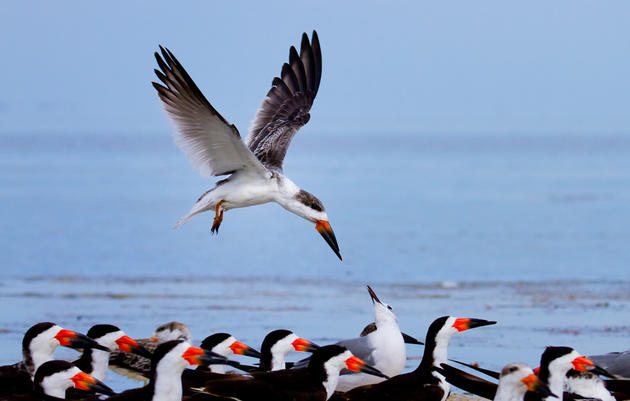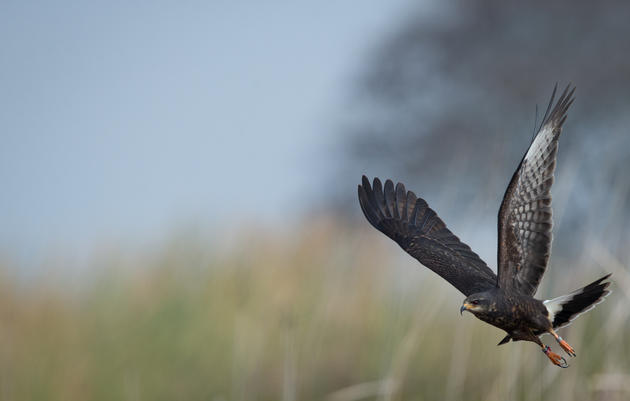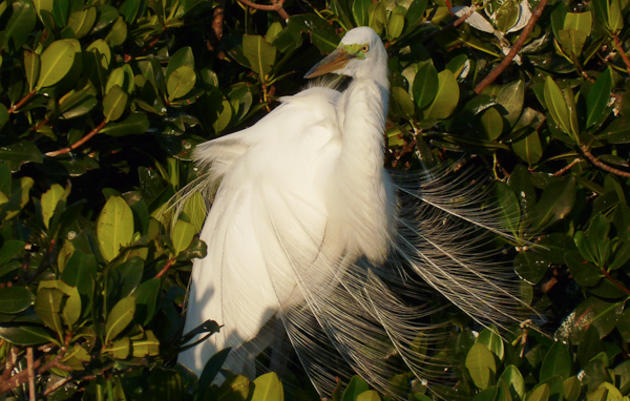Coastal Bird Stewardship
After suffering huge population losses due to the plume trade around the turn of the 20th century, many species of beach-dependent birds are still on the decline. While historically hunted for their feathers, these birds now face loss of habitat due to coastal development, sea level rise, and other reasons.
In order to reverse the declines and stabilize these bird populations, it is necessary to collect and analyze data through surveys and monitoring, to educate the public through interaction and outreach, and to protect nesting colonies and provide sanctuaries where birds can nest, rest and feed with minimal disturbance. Data collected by Audubon's coastal staff is used to target our conservation and protection efforts.
Become a Bird Steward
One way to help Florida's beach-nesting birds is to become a Bird Steward at a beach or rooftop site. At beach-nesting sites, stewards who volunteer help ensure beachgoers do not enter fragile nesting areas and help educate visitors about the remarkable species that rely on Florida's shores for survival. Audubon will train you on the bird protections and biology you will need to be successful. Interested individuals should like spending time on the beach and interacting with the public. Learn more and sign up.
Rooftop-nesting Birds
Due to increased development and human activity on beaches in Florida, many of our beach-nesting birds are facing a loss of suitable nesting habitat. In order to survive in human-dominated landscapes, some species of beach birds have taken to nesting on flat tar-and-gravel rooftops. Rooftops provide open nesting habitat similar to beaches and are free from human disturbance and mammalian predators like raccoons, dogs, and cats, but vulnerable to other threats. Learn how Audubon Florida is working with rooftop-nesting birds and building owners to monitor and protect these species.
Beach Docent
Audubon Florida chapters have become nationally known for initiating the bird steward program, now part of National Audubon's Atlantic Flyway Strategic Plan. As a complement to this highly acclaimed program, we have developed the "Beach Docent" program, offering alternatives ways to engage beachgoers with the ultimate goal of protecting our nesting and migrating shorebirds and seabirds. Docents are encouraged to lead fun and educational beach walks that focus on coastal birds and wildlife in light of a changing climate. Download Audubon Florida's Beach Docent manual. This manual was made possible by a generous donation from the Jessie Ball duPont Foundation.
Project Colony Watch
Project ColonyWatch uses volunteer bird-watchers to adopt and protect local waterbird colonies. By recruiting and training volunteers to become the local "wardens," biologists, and advocates for a nesting colony, we can increase the effectiveness of our colony protection efforts across Florida.
If you are interested in becoming a Bird Steward or participating in any coastal conservation volunteer activity, please send an email with your name, telephone number, and general location to flconservation@audubon.org.
Related
Coastal Conservation
Beach-nesting birds, such as terns and plovers, are struggling to survive in Florida, often because of the intense disturbance by recreational beachgoers.
Florida's Imperiled Birds
Whether resting on a mangrove island or nesting on a barrier island beach, these birds need space, which is increasingly difficult to find.
Florida Coastal Islands Sanctuaries
The mission of the Florida Coastal Islands Sanctuaries is the protection of the great colonial waterbird populations of the Florida coast, and the natural systems that support them.
How you can help, right now
Donate to Audubon
Help secure the future for birds at risk from climate change, habitat loss and other threats. Your support will power our science, education, advocacy and on-the-ground conservation efforts.
Become a Monthly Donor
Donating monthly is flexible, easy and convenient and makes you a champion birds can count on, no matter the season.
Volunteers Needed
Florida's birds and wildlife need your time and energy. Learn how you can become a citizen scientist or a volunteer at one of our nature centers today.






